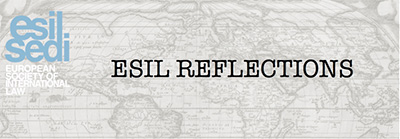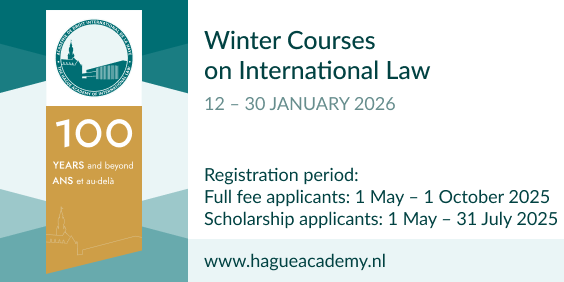Editor: Ana Salinas (Universidad de Málaga)
1. Message of the President

Dear ESIL members,
As spring weather improves in Europe and our successful Research Forum in Catania is now behind us, I hope that, as the academic teaching calendar in much of the Northern Hemisphere winds down, you will all have a moment to engage in creative and more focussed endeavours. In that vein, I believe that it is worth pausing to reflect on the shifting conditions in which many of us live, teach, and write, and on the quiet but persistent pressures that accompany our scholarly commitments.
In recent months, the boundaries between academic engagement and broader societal tensions have grown increasingly porous—sometimes uncomfortably so. Around the world, and within our own academic institutions, we have witnessed renewed debates over the limits of dissent, the scope of freedom of expression, and the role of universities and learned societies as spaces for dialogue and critique. These have not been comfortable challenges for scholars to face, and as international legal scholars (in the broadest sense), we are drawn—at times involuntarily—into fraught conversations about individual responsibility for public engagement, institutional power, and ethical clarity. Beyond our own scholarly exchanges, these conversations are taking place across our auditoria and seminar rooms with our students, and perhaps above all, in our public-facing work, as experts, public intellectuals, and critics.
In my last editorial, I expressed my view that the European Society of International Law ought not to speak with one voice on questions of policy or ideology; but that as all academic institutions and learned societies, we have a heightened responsibility to safeguard and preserve the space in which our debates and activities can take place freely. I believe we have a commitment to openness, to plurality, and to retain an awareness of the diverse contexts from which our members come, the range of positions that they hold, and the uneven conditions under which we teach, write, and speak. When the space for disagreement is narrowed, and scholars are silenced or under pressure to self-censor, academic freedom is diminished—and with it, its emancipatory potential.
At the heart of ESIL’s mission is the belief that international law thrives through pluralism: of method, of perspective, and of voice. This includes, crucially, the voices of those who bring discomforting critiques, who challenge prevailing orthodoxies, and who speak from the margins. Our Society must continue to make room for such voices—not because we agree with every viewpoint, but because the health of international legal scholarship depends on our capacity to hear, to contest, and to evolve.
The events of recent months, both within and beyond our own professional community, have reminded us that, through external forces as well as internal pressures, these habits can be fragile. But I also believe they have underlined the importance of institutional spaces, like our Society, where difference is not a threat to coherence but a condition of intellectual vitality. As we look ahead to our Annual Conference in Berlin, I am confident that it will be marked by precisely this spirit: of thoughtful exchange, of mutual respect, and of collective reflection on what it means to practise and teach international law in an increasingly fraught world.
Yours faithfully,
Gleider Hernández
ESIL President
2. Guest Editorial by Seline Trevisanut: A Loud Plea for the Protection of Human Rights at Sea
On 7 April 2025 the UK based NGO Human Rights at Sea announced the end of its activities. The NGO has been publishing and advocating for more than 10 years for the protection of human rights at sea, and has brough awareness on several related issues.[1] After the termination of the Search and Rescue (SAR) operations by Médecins Sans Frontières in December 2024, the loss of another global organisation in the fight for the protection of individuals at sea is a sad and discouraging news.
In the last 20 years, human rights at sea has attracted broad interest in both practice and scholarship. Scholars first approached the issue through the lens of the exercise of state jurisdiction[2] as the very application of human rights instruments in the maritime domain was debated. International courts and monitoring bodies have helped clarifying several relevant points and affirming the undoubtable application of human rights at sea.
To note, in Xhavara and ors v. Italy and Albania,[3] the European Court of Human Rights (ECtHR) considered that the Albanese vessel Kater I Rades (which sank because of a collision with the Italian warship Sibilla in the international waters of the Otranto Channel on 28 March 1997) was subject to Italian jurisdiction on the basis of the factual circumstances of the case. In the Marine I case, concerning 370 people rescued by Spain in the SAR zone of Senegal,[4] the Committee Against Torture (CAT) recalled its General Comment n. 2 where it affirmed that the jurisdiction of a State party refers to any territory in which it exercises, directly or indirectly, in whole or in part, de jure or de facto effective control.[5] It then added that ‘such jurisdiction must also include situations where a State party exercises, directly or indirectly, de facto or de jure control over persons in detention.’ The ECtHR adopted a similar approach in the Medvedyev and ors v. France case[6] and in the seminal Hirsi Jamaa and ors v. Italy case.[7]
In its views adopted against Italy in January 2021,[8] the UN Human Rights Committee (HRC) affirmed that ‘the individuals on the vessel in distress were directly affected by the decisions taken by the Italian authorities in a manner that was reasonably foreseeable in light of the relevant legal obligations of Italy’ (para. 7.8). Therefore, ‘a special relationship of dependency had been established between the individuals on the vessel in distress and Italy. This relationship comprised of factual elements (…) as well as relevant legal obligations incurred by Italy under the international law of the sea’ (ibid., emphasis added). Hence, the exercise of physical control over individuals is not, anymore, necessary to determine the exercise of jurisdiction over individuals at sea. These cases have dealt in particular with the application of the principle of non-refoulement[9] and the right to life[10] in the context of SAR operations and border management at sea. They have clarified the content of SAR obligations and of the related due diligence obligation, which derives from both the law of the sea and human rights.
The treatment of migrants and the performance of SAR operations have partly monopolised the attention in recent years, but some interesting case law has also developed on the practical consequences of the application of the freedom of expression and association at sea. In 2009, the ECtHR affirmed that the exercise of the freedom of expression consists of a lawful activity compatible with the conditions of exercise of the right of innocent passage.[11] In 2015, an Annex VII Arbitral Tribunal declared that the joint reading of the freedom of navigation and the freedom of expression and association results in the right to protest at sea.[12] This ruling has been confirmed in 2024 by the Amsterdam Court of Appeal concerning Greenpeace protests against deep seabed mining activities in the Pacific Ocean.[13]
The protection of human rights at sea has also become part of the wider debate concerning the link between the protection of the (marine) environment and the enjoyment of human rights, not only in the context of the climate crisis.[14] Moreover, several reports have highlighted the unsafe environment in which (too) many maritime workers perform their duties, flagging instances of modern forms of slavery (see also this recent newspaper item). The conditions of workers at sea, be them seafarers or fishers, are unfortunately still neglected by stakeholders and little studied in scholarship.
Much still needs to be done to guarantee human rights at sea. Two scholarly initiatives have the potential to keep the discussion going and hopefully to push some of the many pressing issues higher on the agenda of states and relevant international organisations. I refer here to the COST Action Blue Rights and the ILA Committee ‘Protection of People at Sea’. The disengagement of NGOs from the field is however alarming and puts considerable pressure on those initiatives, which need to bring their message across louder than ever before.
[1] See in particular the Geneva Declaration on Human Rights at Sea and the several other publications still available on their website.
[2] For early works on this issue, see Oxman, ‘Human Rights and the United Nations Convention on the Law of the Sea’ in Charney and Anton (eds) Politics, Values and Functions: International Law in the 21st Century – Essays in Honor of Professor Louis Henkin (Martinus Nijhoff 1997) 377; Cacciaguidi-Fahy, ‘The Law of the Sea and Human Rights’ (2007) 19 Sri Lanka Journal of International Law 85; Treves, ‘Human Rights and the Law of the Sea’ (2010) 28 Berkeley Journal of International Law 1.
[3] Xhavara and ors v. Italy and Albania (Admissibility Decision), ECHR (2001) Appl. No. 39473/98, 11 January 2001.
[4] CAT, J.H.A v. Spain, 323/2007, Decision 11 November 2008. On 30 January 2007.
[5] General comment No. 2 (2007), CAT/C/GC/2/CRP.1/Rev.4, para. 16.
[6] Medvedyev and ors v. France, Appl. No. 3394/03, 29 March 2010.
[7] ‘[T]he events took place entirely on board ships of the Italian armed forces, the crews of which were composed exclusively of Italian military personnel. In the Court’s opinion, in the period between boarding the ships of the Italian armed forces and being handed over to the Libyan authorities, the applicants were under the continuous and exclusive de jure and de facto control of the Italian authorities (…) Accordingly, the events giving rise to the alleged violations fall within Italy’s ‘jurisdiction’ within the meaning of Article 1 of the Convention’ (paras 81-82; emphasis added)
[8] UNHRC, views adopted by the Committee under article 5 (4) of the Optional Protocol, concerning Communication No. 3042/2017.
[9] See the Hirsi case.
[10] See the Marina I case and HRC views concerning Communication No. 3042/2017.
[11] ECtHR, Women on Waves and Others v. Portugal, 31276/05, Judgment of 3 February 2009.
[12] PCA, The Arctic Sunrise Arbitration (Netherlands v Russia), Award on Merits of 14 August 2015.
[13] NORI v. Sichting Greenpeace Council and v. Sichting Phoenix, judgment of 12 November 2024, para. 4.5.
[14] See ICtHR, Advisory Opinion OC-23/17 of 15 November 2017 requested by the Republic of Columbia, on ‘The environment and human rights.’ Unfortunately, the International Tribunal for the Law of Sea (ITLOS) did not address the link between states obligations in relation to climate change and their human rights obligations in recent Advisory Opinion (ITLOS, Request for an Advisory Opinion Submitted by the Commission of Small Island States on Climate Change and International Law, Advisory Opinion, 24 May 2024), notwithstanding the fact that many participating states raised the issue in their written submissions and oral pleadings
3. Meet an ESIL member – Claudia Cinnirella
 You can find the video introducing Claudia Cinnirella, Postdoctoral Researcher in European Union Law at the Department of Law of the University of Catania and member of the local organising committee of the 2025 ESIL Research Forum in Catania, here.
You can find the video introducing Claudia Cinnirella, Postdoctoral Researcher in European Union Law at the Department of Law of the University of Catania and member of the local organising committee of the 2025 ESIL Research Forum in Catania, here.
4. What’s Going On?
20th ESIL Annual Conference in Berlin – Reconstructing International Law
From 11 to 13 September 2025 the 20th Annual Conference will take place at Freie Universität Berlin. The conference programme will be announced shortly in early May at www.esil2025.de – look forward to plenary events, six fora, 12 agorae and a number of special events with an exciting group of speakers from academia and practice, Europe and beyond, established and up and coming. A special email will go out to all ESIL members once the programme will be online.
The programme committee was extremely excited about both the quantity and quality of the submissions resulting from the call for papers – 470 abstracts had to be processed. Please also check out the call for papers for the various pre-conference IG workshops, which will take place on the afternoon of the 10th and the morning of the 11th of September. These calls for papers can be found on the ESIL website.
Registration for the conference is already open via www.esil2025.de. Make sure to profit from reduced early bird fees for registration until 5 June. Regular fees will be applicable afterwards and until 6 September.
 Joint ESIL-Leuphana Early-Career Workshop on “International Courts and Tribunals Interactions and Challenges”
Joint ESIL-Leuphana Early-Career Workshop on “International Courts and Tribunals Interactions and Challenges”
ESIL and Leuphana University are hosting a joint ESIL-Leuphana early-career workshop on ‘International Courts and Tribunals: Interactions and Challenges‘, to be held on 19-20 June 2025 in Lüneburg, Germany.
The workshop is aimed at early-career researchers (ECRs), with a focus on PhD candidates. It will offer ECRs a platform to present their work, to test arguments, and to benefit from constructive feedback in a supportive environment. To achieve these aims, the workshop will take the form of a small-group discussion focused on ECR work in a particular thematic area. Workshop sessions will be organised around the work of selected participants, which will be commented upon by more established academics and discussed with all workshop participants. All workshop participants are expected to participate actively in these discussions.
The workshop is organised by Leuphana University Lüneburg, with support by the European Society of International Law (ESIL) and input by members of ESIL’s early career network coordinating committee. Please find further details here.

ESIL-supported IG joint conference on “Towards a Global Ecological-Economic Legal Framework”
The ESIL Interest Groups on International Environmental Law, on the European and International Rule of Law and on International Economic Law are jointly organising an ESIL-supported conference on “Towards a Global Ecological-Economic Legal Framework”.
The event will take place at École Normale Supérieure – Paris Sciences et Lettres (ENS-PSL) on 6-7 June 2025. You can find further details here.
5. ESIL Lectures
The ESIL Lecture Series hosts broadcasts of presentations on international law topics held at partner institutions, allowing the presentation to reach a wider audience of ESIL members and non-members alike. ESIL lectures are available on the ESIL website and on the ESIL YouTube Channel.
To propose an ESIL lecture, please read the ESIL Conference Series Guidelines.
Next ESIL Lecture
Speaker : Emeritus Professor Pierre-Marie Dupuy: International Law as the Common Heritage of Mankind
Organiser: Athens Centre of Public International Law, Faculty of Law, University of Athens: Nicolas Politis Lectures
Date: Wednesday 7 May 2025 18:00-19:30 (UTC+3, Athens time)
Venue: Central Building of the University of Athens
The lecture will be livestreamed at http://live.uoa.gr.
All previous ESIL Lectures are listed here.
6. ESIL Paper Series / Conference Proceedings
The ESIL Paper Series features papers presented at ESIL events (Annual Conferences, Research Fora, and Interest Group events). Publication in the ESIL Paper Series enables authors to disseminate their work widely and reach broader audiences without the usual delays involved in more traditional means of publication. It does not prevent the subsequent publication of papers in academic journals or edited collections.
The current Series editors are ESIL Board members Federica Paddeu and Patryk Labuda.
ESIL Papers are included in the EUI CADMUS Research Repository. All the papers presented at previous events from 2021 to 2023 are available here.
The ESIL Paper Series have been revamped to “ESIL Conference Proceedings” to create as complete a record as possible of the ESIL Conference (including interest group events), with a view to making it more inclusive and to providing a more comprehensive picture of the themes and ideas discussed at the Conference. To this end, after ESIL events, all speakers are invited to contribute notes of no more than 3,000 words (including footnotes) reflecting their remarks delivered at the Conference.
7. ESIL Book Series
ESIL Book Series publishes high-quality volumes on various international law themes. The good news is that the ESIL Board has broadened the scope of the ESIL Book Series, beyond the themes of ESIL Annual Conferences and ESIL joint events. Proposals based on IG events and other ESIL events are welcome. Other proposals from ESIL members are also within the scope of the Book Series. Potential editors are welcome to get in touch with the General Editors with proposals for edited volumes to shape the future of ESIL scholarly publication. The General Editors are Christian J. Tams and Machiko Kanetake.
8. ESIL Reflections
ESIL Reflections offer up-to-date reflections on current issues in international law. The Reflections cover a wide range of topics relating to current developments in international law and practice as well as theoretical reflections in a way that is relatively accessible to non-experts. The aim is to foster discussion between ESIL members and international law scholars and practitioners more generally – in Europe, but also beyond. ESIL Reflections are published on this website and distributed freely to ESIL members.
The editors are Patrycja Grzebyk (editor-in-chief), Lucas Lixinski, Alina Miron, Anne Saab and Peter-Tobias Stoll.
ESIL Members who have an interest in contributing are encouraged to do so. Please contact Patrycja Grzebyk ([email protected]) if you would like to contribute.
Latest publications:
9. News from Interest Groups
 ESIL Interest Groups are a vital part of the Society’s success and activities. A list of the groups is available on the ESIL website.
ESIL Interest Groups are a vital part of the Society’s success and activities. A list of the groups is available on the ESIL website.
Interest Group on the History of International Law
The IG has recently published a Call for Nominations for the 2024 ESIL IG History of International Law Article Prize. The deadline for nominations is 9 May 2025. Further details are available here.
In addition, the IG is hosting a pre-conference workshop in Berlin, and the programme is now available here.
Interest Group on Migration and Refugee Law
The IG has recently published the blog symposium, Advanced Digital Technologies in Migration Management Data Protection and Fundamental Rights Concerns, hosted by Volkerrechtsblog. The symposium included the contributions of Agnese Palazzi, Irene Baceiredo-Macho and Francesca Tassinari.
Interest Group on International Business and Human Rights
It is our great pleasure to share with you the successful completion of the Economic Sanctions & Human Rights webinar series, organised under the auspices of the ESIL Interest Group on International Business & Human Rights. The three events — “Sanctions designations and human rights: Current and emerging issues” (moderated by Nina M. Hart), “Sanctions compliance, enforcement, and human rights” (moderated by Nina M. Hart, Belen Olmos Giupponi and Emanuela Orlando), and “Sanctions, arbitration, and human rights” (moderated by Cristina Elena Popa Tache) — provided a valuable forum for legal reflection and interdisciplinary exchange, attracting an impressively large audience whose enthusiasm and engagement truly amazed us.
Interest Group on the International Law of Culture
The IG recently organised three events. On 18 February 2025, it held an online book launch: ‘The 1970 UNESCO and 1995 UNIDROIT Conventions on Stolen or Illegally Transferred Cultural Property: A Commentary (OUP 2024)’. On 25 February, the IG – in cooperation with the IGs of the Cultural Heritage and the Arts Interest Group (CHAIG) of the American Society of International Law (ASIL) – hosted a webinar entitled ‘The Legal Dimension of Provenance Research: International, Comparative, Indigenous’. As part of the 2025 ESIL Research Forum, it also prepared and organized an online workshop on ‘Cultural Heritage, Social Resilience and Crisis Response in International Law’ (17 March 2025). In the coming days, the IG will also announce the programme for the workshop on ‘The Future and Past of “Progress” in Cultural Heritage Law’, which will be held as part of the ESIL Annual Conference in Berlin.
Interest Group on International Legal Theory and Philosophy
The IG has launched a call for candidates to elect four new co-ordinating committee members. The deadline for the submission of candidacies is Wednesday, 7 May 2025. If you are a current IG member, you will have received the call in your inbox. Should you wish to receive further information, please get in touch with the ESIL Secretariat.








